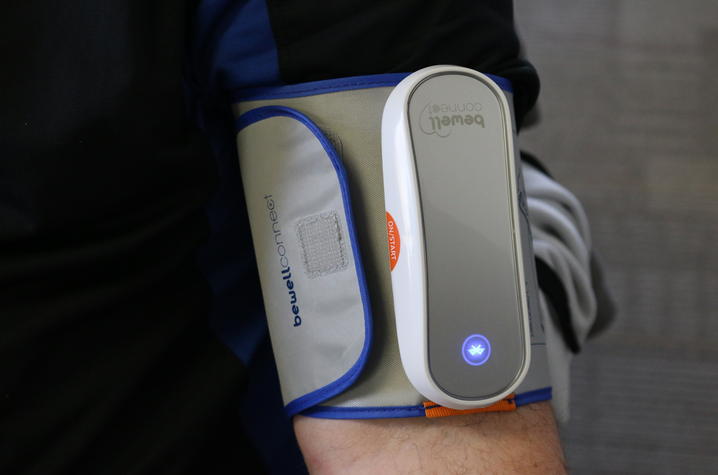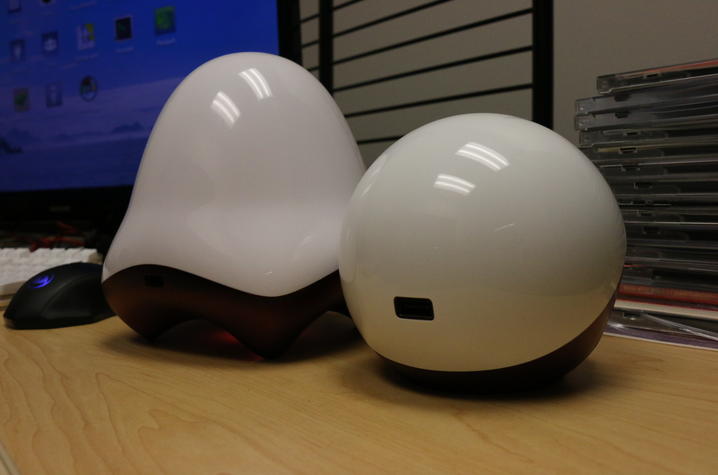UK College of Communication and Information Hosts Technology Usability Lab
LEXINGTON, Ky. (May 11, 2016) — An innovative new program at the University of Kentucky explores human-computer interaction. Senior Associate Dean for Administrative Affairs Derek Lane and College Media Officer Nathan Stevens, along with Dean Dan O’Hair, of the UK College of Communication and Information, have pioneered a new multidisciplinary venture they are calling the CI Collective.
The CI Collective is a program hosted by the College of Communication and Information that includes a technology usability lab where students and faculty can work together to test emerging technologies. The primary purpose of the CI Collective is to support interdisciplinary research on human-computer interaction and related areas in understanding how people use communication technology and learn from information systems.
Technology developers might have one use in mind, but consumers of all ages may find that a technological device may be used to fill a separate and distinct need. Research conducted in the CI Collective will help determine how users interact with technology and learn from information systems.
“A usability lab is where people bring in technology and folks to use the technology, and then they study and survey what they like about it, what they hate about it, what they think should be improved about it,” Stevens said.
Another facet of the program involves bringing in professional IT people, who actually study how and why people might adopt these technologies.
Together these two groups of people generate a report to review the product and send it to the technology companies.
“Basically it’s a partnership where we learn together about how any communication technology might be adopted and attempt to understand potential gains and pain points,” Lane said. “Companies make their technology available, then we conduct usability research with it, analyze the data, write the reports and send our results back to them. Our research is unbiased and tends to be more trustworthy than proprietary research.”
These reviews, based on empirical research, are impartial and objective — a valuable way for technology companies to understand how consumers might potentially use their products.
The CI Collective provides benefits to the UK campus community in multiple ways. In particular, students can gain valuable experience as both interns and research participants.
“First, it gives the students experience of how a usability lab works,” Stevens said. “That’s vital because people can make a living managing a usability lab.”
It also gives students opportunities to work on personal research or product development.
“If students have an idea and they want to engage in design thinking and rapid prototyping, they should be able to do that in our lab,” Lane said.
In addition, faculty will have access to technology that can help extend current research programs.
“It will help campus because one of our goals is to get faculty members in to help with their research or to find new ways to build their research agenda,” Stevens said.
“Faculty from across campus can access the resources and facilities and decide how, if at all, existing technology might extend their research programs,” Lane said.
Research in the CI Collective will also be used to help other communities. The lab is currently working with technologies that have been shared with UK researchers from places as far away as Paris, France.
Some technologies that are being studied include various devices that help monitor, track and report health diagnoses. These products can be especially helpful in the Appalachian region where patients are not always located near health care facilities. Eventually Lane and Stevens hope this research can be applied to developing countries as well.
“Being able to help communities that may not be able to help themselves is a goal of our lab,” Stevens said.
In addition to working with technologies to improve health care, the lab also explores interactive home automation systems, virtual reality technology, 3D printing, robotic telepresence and virtual video gaming.
“We are excited about the possibilities, and we think it’s a really cool place for students to think about the research we conduct in the college and across campus in very unique ways,” Lane said.
O’Hair and Lane began discussing this project a few years ago, and they are excited that it’s finally coming to fruition.
“I am so pleased that our initial idea about a usability lab is becoming a reality," said Dean O'Hair. "Information communication technologies are often ignored or slow-tracked because they do not have an empirical track record of success. That is where the CI Collective plays a key role."
While the project has been in development since October, Lane and Stevens hope to have it past the preliminary stage and fully developed before the end of the fall 2016 semester.
If anyone is interested in collaborative projects or if students are interested in working in the lab as an intern, participating in research studies as a product tester or learning more information about how to get involved, they should contact Nathan Stevens at nss@uky.edu.
UK is the University for Kentucky. At UK, we are educating more students, treating more patients with complex illnesses and conducting more research and service than at any time in our 150-year history. To read more about the UK story and how you can support continued investment in your university and the Commonwealth, go to: uky.edu/uk4ky. #uk4ky #seeblue
MEDIA CONTACT: Whitney Harder, 859-323-2396, whitney.harder@uky.edu






